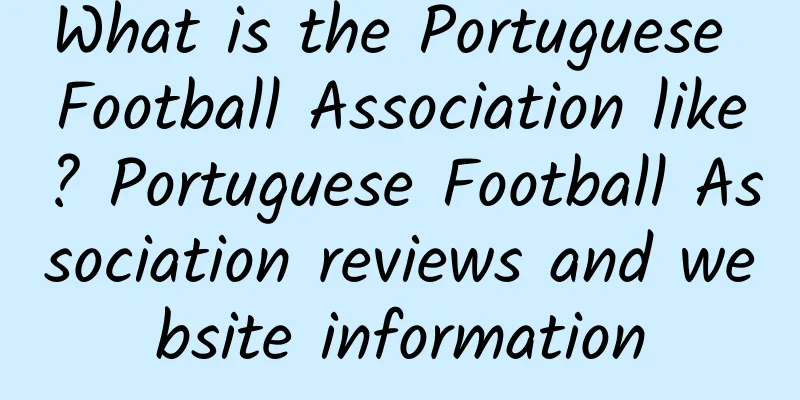What is the Portuguese Football Association like? Portuguese Football Association reviews and website information

|
What is the website of the Portuguese Football Association? The Portuguese Football Association (Federação Portuguesa de Futebol) is the governing body of football in Portugal. It was founded in 1914 and is headquartered in Lisbon. In 1923, it joined FIFA and in 1954, it joined UEFA. The association is mainly responsible for organizing and managing leagues at all levels, the Portuguese Cup, the Portuguese Super Cup and the Portuguese national team. Famous players include Eusebio, Figo, Ricardo Penrina, Paulo Ferrara, Joao Pinto, Cavaro, Digo, C Ronaldo, Nuno Gomes, Pauleta, Baia and Maniche. Website: www.fpf.pt The Portuguese Football Association (Federação Portuguesa de Futebol, FPF for short) is the governing body of Portuguese football. It was founded in 1914 and is headquartered in Lisbon. As the highest governing body of Portuguese football, FPF is responsible for organizing and managing leagues at all levels, the Portuguese Cup, the Portuguese Super Cup and the affairs of the Portuguese national team. The Portuguese Football Association is not only the core organization of Portuguese football, but also an important member of the International Football Federation (FIFA) and the Union of European Football Associations (UEFA). History of the Portuguese Football AssociationThe establishment of the Portuguese Football Federation marks the formal organization and standardization of Portuguese football. In 1914, the Portuguese Football Federation was established in Lisbon with the aim of promoting and developing football in Portugal. In its early days, the main tasks of the FPF were to organize and manage domestic football matches and to formulate corresponding rules and standards for the development of Portuguese football. In 1923, the Portuguese Football Association officially joined FIFA and became a member of the international football family. This move not only enhanced the influence of Portuguese football on the international stage, but also provided more opportunities and resources for the development of Portuguese football. In 1954, the Portuguese Football Association joined UEFA, further consolidating its position in European football. Responsibilities of the Portuguese Football AssociationAs the highest governing body of Portuguese football, the Portuguese Football Federation shoulders a number of important responsibilities. First of all, FPF is responsible for organizing and managing all levels of leagues in Portugal, including the Portuguese Super League, the Portuguese First Division, etc. These leagues are not only an important part of Portuguese football, but also provide a solid foundation for the development of Portuguese football. Secondly, the Portuguese Football Association is also responsible for organizing and managing domestic cup competitions such as the Portuguese Cup and the Portuguese Super Cup. These competitions not only provide a stage for Portuguese clubs to demonstrate their strength, but also bring a wonderful football feast to the fans. In addition, the Portuguese Football Association is also responsible for managing the affairs of the Portuguese national team. The Portuguese national team is the symbol of Portuguese football, and its performance in international competitions is directly related to the reputation and status of Portuguese football. Through scientific management and training, the FPF continuously improves the strength of the Portuguese national team and enables it to achieve great results in international competitions. Famous players of the Portuguese Football AssociationThe Portuguese Football Association has produced many world-class football stars who have won numerous honors for Portuguese football in international competitions. The following are some of the famous Portuguese football players:
The future of the Portuguese Football AssociationThe Portuguese Football Federation has made brilliant achievements in the past 100 years, but the future development is still full of challenges and opportunities. FPF will continue to be committed to promoting the development of Portuguese football and continuously improve the overall level of Portuguese football through scientific management and training. First, the Portuguese Football Federation will continue to strengthen the training of youth football. Youth football is the future of Portuguese football. FPF will provide better training and competition opportunities for young players by establishing more youth training centers and football schools. Secondly, the Portuguese Football Federation will continue to improve the level of the domestic league. The Portuguese Super League is the core event of Portuguese football. FPF will improve the competitiveness and viewing of the league by introducing more outstanding players and coaches. In addition, the Portuguese Football Association will continue to strengthen cooperation with FIFA and UEFA, actively participate in international competitions, and enhance the international influence of Portuguese football. Official website of the Portuguese Football AssociationThe official website of the Portuguese Football Association (www.fpf.pt) is an important window to understand Portuguese football. Through this website, fans can obtain the latest match information, player dynamics, match results, etc. In addition, the website also provides a wealth of football resources and teaching videos, providing a platform for football fans to learn and communicate. The official website of the Portuguese Football Association is not only a platform for information release, but also an interactive community. Fans can participate in various interactive activities through the website and share their football stories and experiences with other fans. ConclusionAs the highest governing body of Portuguese football, the Portuguese Football Association shoulders the important mission of promoting the development of Portuguese football. In the past 100 years, FPF has achieved brilliant achievements and cultivated many world-class football stars. In the future development, FPF will continue to be committed to promoting the progress of Portuguese football, and through scientific management and training, continuously improve the overall level of Portuguese football, and bring more exciting games and unforgettable moments to fans. |
<<: What is FC Dallas like? FC Dallas reviews and website information
>>: What are the Washington Redskins like? Washington Redskins reviews and website information
Recommend
The efficacy and function of lime
Sour lime is a type of orange. It is round in app...
The efficacy and function of grapefruit flesh and how to eat grapefruit flesh
Pomelo pulp is the pulp of the fruit pomelo. It i...
The efficacy and function of strawberry wine
Everyone must have eaten strawberries, but have y...
Lotus Seed and Lily Porridge
I believe everyone is familiar with lotus seed an...
Nutritional value and efficacy of chili peppers How to eat chili peppers
The chili pepper is the most common chili pepper ...
How is Zing.vn? Zing.vn review and website information
What is Zing.vn? Zing is a famous portal website i...
How to distinguish between Bauhinia and Bauhinia
Bauhinia is a flower that likes light and a warm ...
How to make abalone chicken porridge
How to make abalone chicken porridge? I believe t...
Can I eat leeks if I have stomach problems? Can I eat leeks if I have stomach problems?
Leek is a dish that we often eat. It is rich in n...
How is the Yuanju German Chinese Community? Yuanju German Chinese Community Reviews and Website Information
What is the Yuanju German Chinese Community websit...
How to make delicious fish glue How to make fish glue
Fish maw is the skin of pigs, rich in protein, an...
How to make carambola tea
How many of you know how to make carambola tea? I...
How to eat banana tree core? What are the functions of banana tree core?
Everyone must have eaten bananas. They know that ...
Vietnamese melon pictures How to eat Vietnamese melon
Friends who have been to Vietnam may have heard o...
How to make papaya to enlarge breasts, how to eat papaya to enlarge breasts
Papaya is known as the "king of all benefici...









